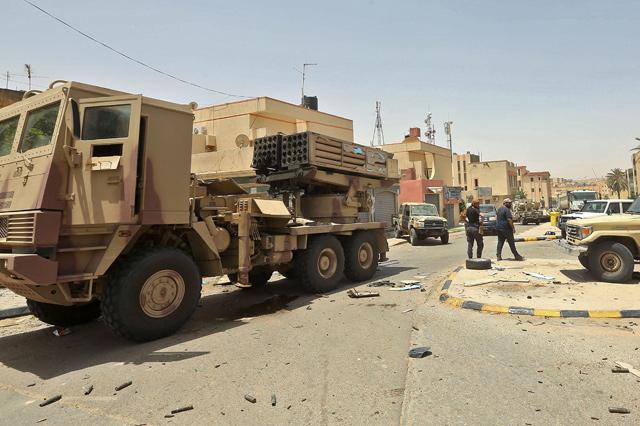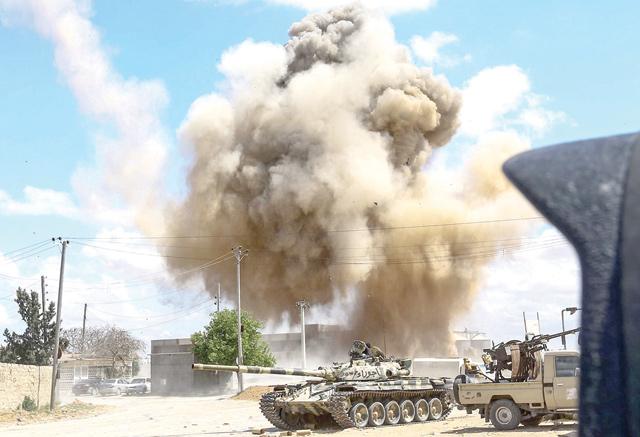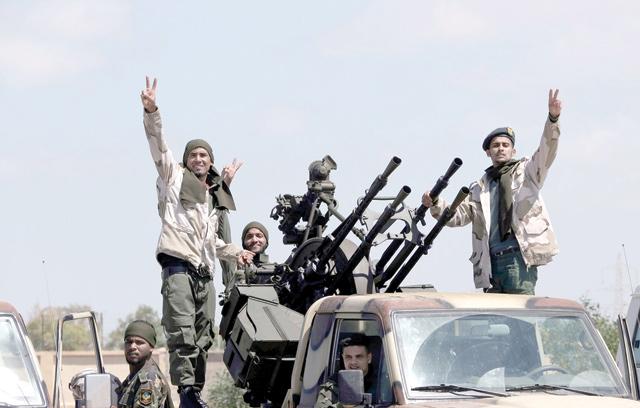You are here
Libya’s unity forces in battle to retake strategic Sirte
By AFP - Jun 07,2020 - Last updated at Jun 07,2020

Fighters loyal to Libya's UN-recognised Government of National Accord stand by a rocket launch truck in the town of Tarhouna, about 65 kilometres southeast of the capital Tripoli, on Friday (AFP photo)
TRIPOLI — Fighters loyal to Libya's UN-recognised government on Sunday kept up their counter-offensive against forces of Khalifa Haftar, but fighting slowed on the outskirts of the strategic city of Sirte.
The Mediterranean coastal city — the home of former dictator Muammar Qadhafi, who was ousted and killed in 2011 in a NATO-backed uprising — is also a key gateway to the country's major oil fields in the east.
The Turkish-backed Government of National Accord (GNA) based in Tripoli has in recent weeks retaken all remaining outposts of western Libya from pro-Haftar loyalists, who had sought to capture the capital in a 14-month offensive.
Haftar, following his string of military setbacks, was in Cairo on Saturday where he supported a ceasefire proposal made by his key backer, President Abdel Fattah Al Sisi, meant to take effect at 04:00 GMT on Monday.
The so-called "Cairo declaration" called for the withdrawal of "foreign mercenaries from all Libyan territory, dismantling militias and handing over their weaponry", Sisi said.
But the resurgent GNA has rejected the truce plan and bombarded Sirte, the last major settlement before the traditional boundary between western Libya and the east, Haftar's traditional stronghold.
Mohamad Gnounou, a spokesman for the GNA's forces, declared on Saturday that "we will choose the time and place when" the war ends.
He said air strikes were targeting enemy positions in Sirte and “orders have been given to our forces to begin their advance and to systematically attack all rebel positions”.
Pro-GNA forces also said they had on Saturday shot down a Chinese-made Wing Loong drone supplied by the Emirates to the Haftar camp nearby.
However, fighting stalled on the outskirts of the city on Sunday, GNA sources acknowledged.
‘War crimes’
Libya has been in chaos since the fall of Qadhafi, which also opened a new gateway in north Africa for desperate migrants bound for Europe.
The latest key chapter in the Libya conflict, Haftar’s offensive on Tripoli — which began in April 2019 — has resulted in hundreds of deaths, many of them civilians, and has driven more than 200,000 people from their homes.
Haftar — a 76-year-old former Qadhafi loyalist turned defector who spent years living in the United States — has vowed to rule all of Libya, painting his enemies as terrorists.
In early January, when Haftar’s forces were still besieging Tripoli, they also took Sirte, almost without fighting, after securing the allegiance of a local armed group.
Previously Sirte, some 450 kilometres east of the capital, had been controlled by pro-GNA forces dominated by fighters from Misrata who had earlier driven out the Daesh group from the city.
Sirte is key for access to Libya’s crucial “oil crescent”, which has been blockaded by pro-Haftar groups since January, heavily impacting the sector that is virtually the only source of national income.
The Libyan National Oil Company on its website deplored “a severe drop” in oil revenues, “estimated at 97 per cent compared to April 2019”, although much of this was also down to the huge slump in global oil prices.
“Losses have exceeded $5 billion,” it said on Facebook Sunday.
The security situation meanwhile remained fragile and confused elsewhere in the west, especially in Tarhuna, the last pro-Haftar stronghold to be recaptured by GNA forces.
Tripoli authorities warned against acts of reprisal or looting in the city, threatening severe criminal prosecution regardless of function or rank.
The GNA’s interior ministry on Saturday called on the military and security forces in charge in the “liberated areas” to ensure the protection of the “lives, dignity and property” of citizens.
Rights group Amnesty International warned last week that “war crimes and other violations” may have been committed by warring parties near Tripoli.
These included indiscriminate attacks, looting and the planting of anti-personnel landmines in homes, Amnesty said, often in retaliation against civilians for their perceived affiliation to one side or another.
Related Articles
TRIPOLI — Libyan strongman Khalifa Haftar's capture of the strategic city of Sirte on Monday was a major setback for Tripoli's UN-recognised
TRIPOLI — The conflict shaking Libya escalated Sunday as forces of strongman Khalifa Haftar launched an air strike on a suburb of Tripoli an
BENGHAZI — At least 11 people were beheaded Wednesday in an attack claimed by the Daesh extremist group on a checkpoint man
















